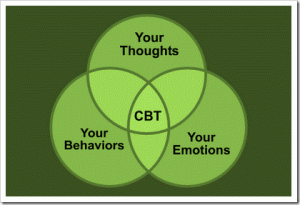Cognitive Behavioural Therapy
 Cognitive Behavioural Therapy (CBT) seeks to give you more choice about how you think, feel and behave, by giving you tools to understand WHY you react as you do. It helps you see the link between your thoughts and beliefs (cognition) and your emotions and behaviour. My logo (the vase-face) can be seen in both those ways. In CBT we look at important situations in your life and look at them to see if we can see them differently.
Cognitive Behavioural Therapy (CBT) seeks to give you more choice about how you think, feel and behave, by giving you tools to understand WHY you react as you do. It helps you see the link between your thoughts and beliefs (cognition) and your emotions and behaviour. My logo (the vase-face) can be seen in both those ways. In CBT we look at important situations in your life and look at them to see if we can see them differently.
CBT is not ‘make believe’ – what matters about a belief is that it usefully corresponds to reality, not that it makes you feel good, or that it is ‘positive’.
In CBT we take your reactions, including your emotions, very seriously. Sometimes they point to important truths about a situation. Other times they are left-overs from a time in your life that is now over. CBT helps you tell the difference, and to choose how you respond, rather than react, to difficult situations.
Mindfulness Based Approaches

“Mindfulness is the awareness that arises by paying attention, on purpose, in the present moment, and non-judgementally” Jon Kabat-Zinn
Behind so many psychological problems lies a belief that certain thoughts and feelings are unbearable. Mindfulness builds on CBT by helping us notice that our thoughts and feelings, although important, can be observed to be simply what they are: thoughts and feelings.
They are not ‘the truth’. They are real, to be acknowledged and not avoided, but not necessarily to be acted upon. Mindfulness practice trains us to put a pause between an event and our response to it, and then to choose that response according to our values, not our immediate urges.
I use insights from several mindfulness-based approaches including Mindfulness-based stress reduction (MBSR), Mindfulness-based Cognitive Therapy (MBCT) and Acceptance and Commitment Therapy (ACT).
Attachment Approach
 The scientific study of the way that children attach to their parents or ‘primary care-giver’ was initiated by John Bowlby, who brought together insights from animal behaviour, psychoanalysis, and developmental psychology.
The scientific study of the way that children attach to their parents or ‘primary care-giver’ was initiated by John Bowlby, who brought together insights from animal behaviour, psychoanalysis, and developmental psychology.
Understanding your own patterns of attachment as a child will help you to make sense of the way you experience relationships as an adult. I believe that lasting therapeutic change needs to account for your childhood experience in order to provide practical solutions for your relationships.
‘Systemic’ just means understanding how you fit into the system of relationships around you. ‘No man is an island’ as John Donne wrote. My approach is to be curious about where you fit into your own family, friendship, and work dynamics. Sometimes people think they’ve just ‘caught’ depression as if it is some kind of unfortunate illness like a virus.
More often than not, your emotional problems have arisen because of the dynamics between you and others. This approach does not cast blame. The intention is to understand compassionately why you feel as you do so that you can take responsibility for the way you respond, regardless of the behaviour of others.
Trauma Work
If you have experienced a major trauma in your life, such as sexual abuse, a road traffic accident, or been in military combat, you may have experienced flashbacks, hypersensitivity to situations that remind you of your trauma, difficulties with sleep, and with managing your emotions.
Post-Traumatic Stress Disorder is one possible diagnosis, and the two treatments recommended by NICE guidelines for PTSD are trauma-focussed CBT, and EMDR, both of which I use in my work.

